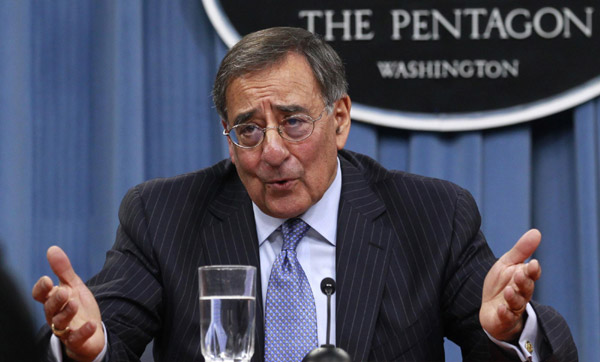Pentagon cuts reshape military, trim costs
Updated: 2012-01-27 09:07
(Agencies)
|
||||||||
|
 |
|
US Defense Secretary Leon Panetta gestures as he briefs the media at the Pentagon Briefing Room in Washington, DC January 26, 2012. [Photo/Agencies] |
WASHINGTON - The Pentagon unveiled a 2013 budget plan that would cut $487 billion in spending over the next decade by eliminating nearly 100,000 ground troops, mothballing ships and trimming air squadrons in a bid to create a smaller, agile force with a new strategic focus.
The funding request, which includes painful cuts that will be felt across the country, comes at a historic turning point for the military as it winds down 10 years of war in Afghanistan and Iraq and shifts its strategic focus to the Asia-Pacific region and the Middle East.
The budget plan, sharply criticized by some lawmakers, sets the stage for a new struggle between President Barack Obama's administration and Congress over how much the Pentagon should spend on national security as the country tries to curb its trillion-dollar budget deficits.
"Make no mistake, the savings that we are proposing will impact all 50 states and many districts, congressional districts across America," Defense Secretary Leon Panetta told a news conference at the Pentagon on Thursday.
"This will be a test of whether reducing the deficit is about talk or action."
Panetta, previewing a budget to be made public Feb 13, said he would ask for a $525 billion base budget for the 2013 fiscal year, the first time since before the Sept 11, 2001, attacks that the Pentagon has asked for less than the previous year. That compares with $531 billion approved this year.
Panetta said he would seek $88.4 billion to support overseas combat operations, primarily in Afghanistan, down from $115 billion in 2012 largely due to the end of the war in Iraq and the withdrawal of US forces there at the end of last year.
Congress ultimately controls the Pentagon's purse strings and regularly intervenes to change the size and detail of military spending as it sees fit. The Defense Department's budget accounts for about 20 percent of total federal spending.
Republican lawmakers who oversee military affairs on Capitol Hill sharply criticized the plan.
Senator John McCain said it "ignored the lessons of history" by imposing massive cuts on the military, and Representative Buck McKeon said it reflected "Obama's vision of an America that is weakened, not strengthened, by our men and women in uniform."

 Relief reaches isolated village
Relief reaches isolated village
 Rainfall poses new threats to quake-hit region
Rainfall poses new threats to quake-hit region
 Funerals begin for Boston bombing victims
Funerals begin for Boston bombing victims
 Quake takeaway from China's Air Force
Quake takeaway from China's Air Force
 Obama celebrates young inventors at science fair
Obama celebrates young inventors at science fair
 Earth Day marked around the world
Earth Day marked around the world
 Volunteer team helping students find sense of normalcy
Volunteer team helping students find sense of normalcy
 Ethnic groups quick to join rescue efforts
Ethnic groups quick to join rescue efforts
Most Viewed
Editor's Picks

|

|

|

|

|

|
Today's Top News
Health new priority for quake zone
Xi meets US top military officer
Japan's boats driven out of Diaoyu
China mulls online shopping legislation
Bird flu death toll rises to 22
Putin appoints new ambassador to China
Japanese ships blocked from Diaoyu Islands
Inspired by Guan, more Chinese pick up golf
US Weekly

|

|






